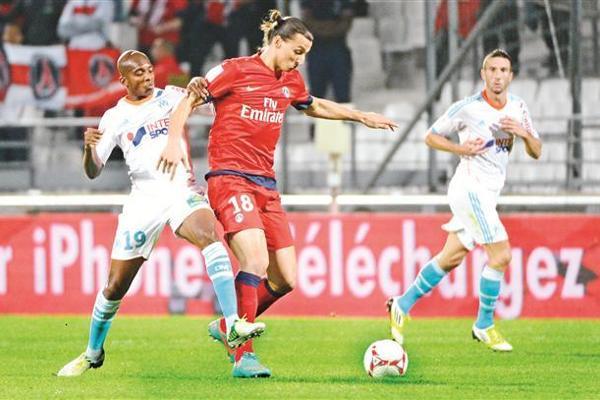Qatar’s French love affair consummated with football
James M. Dorsey Hürriyet Daily News


Superstar Swedish forward Zlatan Ibrahimovic (C) is one of several high-profile players who moved to Paris Saint-Germain after its Qatari owners injected millions of Euros into the French club. ABACA PRESS photo
When Qatar first began to nibble at the idea of acquiring Paris Saint-Germain (PSG) 6 years ago, its interest reportedly evaporated because of the violence of PSG’s fans and the fact that two of the club’s key stakeholders — Canal Plus, which accounts for much of its revenues through its Ligue 1 broadcast rights, and the city of Paris, which owns PSG’s home stadium Parc des Princes — felt queasy about signing a deal with a non-democratic ruler.The unease of both parties evaporated, according to French media reports, when 4 years later then-French President Nicolas Sarkozy invited Qatar’s Crown Prince, Sheikh Tamim Bin Hamad al-Thani, and European football body UEFA President Michel Platini to the Elysée Palace for a lunch that was attended by Sebastien Bazin, the European representative of PSG’s majority American owners Colony Capital. Media reports said the lunch was designed to salvage the financially troubled club at a time when it was hemorrhaging an estimated 20 million Euros a year. The luncheon crowned several months of efforts by Bazin to rekindle Qatari interest in the financially troubled club.
According to sources, on the table was a three-way deal: Qatar would acquire PSG and step up its already substantial investments in France; Platini, a member of world football body FIFA’s executive committee whose son has reportedly since gone on to be legal advisor to Qatar Sports Investment, would vote in favor of Qatar’s bid to host the 2022 World Cup; and Qatar’s state-owned Al Jazeera television network would have an opportunity to buy a stake in France’s Ligue 1 broadcast rights.
Sarkozy “was very interested in the dossier. He was keen because these people wanted to invest in France, but also because he’s a (PSG) supporter,” then-Elysée spokesman Franck Louvrier was quoted as saying.
The deal spotlights economically troubled France as a prime example of how Qatar leverages its financial clout to its commercial and political advantage with business ventures as well as diplomatic initiatives in what amounts to a love affair with France based on a concerted effort by the French to woo the Gulf state that started when Sarkozy was still interior minister.
‘Very strong’ relations
To cement the relationship, the French Parliament passed a bill in 2009 that granted a capital gains tax exemption to Qatari companies on property they own in France. An appendix to the bill stresses the “very strong” and “privileged” relations between France and Qatar, based on “the wish of the Qataris to diversify their alliances and their partnerships so as not to depend exclusively on the United States.”
Qatari holdings in France include real estate properties as well as the investment of millions of euros into the promotion of economic activity in France’s depressed suburbs through small and medium-sized enterprises. It also includes sponsorship of France’s most famous horse race Prix de l’Arc de Triomphe, the acquisition of PSG and the club’s 100 million euro sponsorship deal with Qatar National Bank as well as investments in major French companies.
In an interview with Al-Monitor, Qatar’s ambassador to France Mohamed Al Kuwari explained Qatar’s interest in France, saying “you invest in France, you build partnerships and you go elsewhere, to Africa, to Asia. We are looking for strong partners like Total, Vinci, Veolia.” He also said that France, like Qatar, “has an independent policy and plays an important role in the world, diplomatically and politically.”
The deal served both French football and Qatar’s stated-owned global broadcaster Al Jazeera, best known for its coverage of the Middle East and North Africa. With Orange opting not to bid for the French league’s 2012-2016 tender income from broadcast rights, the financial lifeline of French clubs, was likely to drop with Canal Plus left as the only expected contender. That changed with Al Jazeera’s entry into the fray. Its purchase of French broadcasting rights for 300 million euros ensured that revenues remained at levels comparable to those in recent years.
“We are going to look at all the opportunities in Europe. We are going to study each market one by one and if there is room for another channel, then we will go,” said Nasser al-Khelaifi, director of Al Jazeera Sports and head of PSG.
Qatar sees football as a way to enhance its international prestige, punch internationally above its weight, build sports as an economic sector that enhances tourism and makes it a key node in the world’s sports infrastructure and create leverage for further business opportunities.
An expert on Qatar who requested anonymity argues that “Qatar needs all of this to survive. It needs to be everywhere to compensate for its geo-political vulnerability. It doesn’t have the means to pursue a long-term strategy by implementing itself abroad or through its investment policies. They are handicapped by their own demographics,” he said referring to the fact that Qatari nationals account for approximately 20 per cent of Qatar’s population of 1.7 million. As a result, he says, “Qatar is projecting itself as the global center of the Arab world and a 21st Century center of the Islamic world.”
